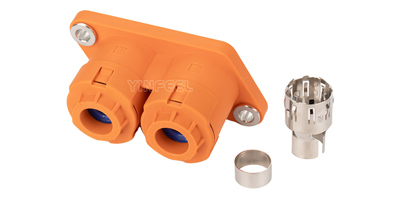In industrial settings, equipment relies on stable connections to transfer power and signals—connections that can't fail under harsh conditions like vibration or high temperatures. One component that ensures this stability is the Through Hole Connector, a part often overlooked but critical to keeping industrial systems running smoothly. This article breaks down its key roles and why it matters for industrial operations.
Through Hole Connectors are not just "links" between parts; they are designed to solve specific challenges in industrial environments. Their two main roles stand out for supporting reliable equipment performance.
Industrial equipment—such as assembly line machines or heavy-duty generators—often operates in high-vibration environments. Unlike surface-mounted connectors that sit on top of circuit boards, Through Hole Connectors are inserted through the PCB and soldered to the opposite side. This creates a rigid bond that resists loosening over time, even when the equipment is subjected to constant movement or shocks. This stability prevents sudden disconnections that could stop production lines.
Many industrial machines—like motor drives or power distribution units—require transferring large amounts of current to function. Through Hole Connectors are built with thicker pins and a more robust structure, allowing them to carry higher current levels without overheating. This is essential for equipment that runs continuously, as overheating connectors can cause short circuits or permanent damage to expensive industrial systems.

Beyond their basic functions, Through Hole Connectors address long-term needs of industrial operations, from reducing maintenance costs to ensuring compatibility.
Industrial equipment is built to last for years, even decades. Through Hole Connectors' soldered design provides a durable connection that maintains performance over this long lifespan. Unlike some connectors that degrade or loosen with repeated use, they minimize the risk of contact failures—issues that would require costly downtime to repair. For factories or plants where downtime can mean lost revenue, this reliability is a key factor in keeping operations efficient.
Industrial facilities often use a mix of new and older equipment. Through Hole Connectors have a standardized design that works with both legacy and modern PCBs, making it easier to upgrade or repair systems without replacing entire boards. When maintenance is needed, their through-hole design also simplifies inspection and replacement—technicians can easily access the soldered joints to check for wear, reducing the time spent on troubleshooting.
Through Hole Connectors play a quiet but vital role in industrial equipment: they keep connections stable in harsh conditions, handle the power demands of heavy machines, and ensure systems run reliably for years. For industrial operators, choosing the right connector isn't just about picking a part—it's about protecting their equipment investment and avoiding costly disruptions.
If you're looking for Through Hole Connector options that meet the demands of industrial environments—whether for vibration-resistant applications or high-current systems—you can explore our product lineup on the [company product page]. Our connectors are engineered to align with the reliability and performance needs of industrial operations.